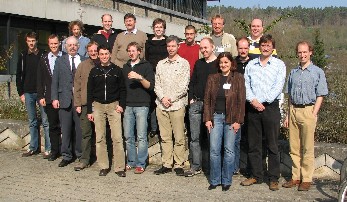The formation of planets is one of the key questions in
astrophysics. The first step in this process is the
coagulation of dust: the growth from sub-micron dust
particles to ever larger aggregates ultimately leading to
the formation of multi-kilometer sized `planetesimals'.
Once these planetesimals are formed, gravitational
interaction starts to dominate over all other forces, and
eventually leads to the formation of rocky planets. In our
Forschergruppe we focus on the first stage in the
planet formation scenario, i.e. on the growth process from
dust to planetesimals.
This stage suffers from a large number of unsolved
mysteries, many of which are critical to our understanding
of the planetesimal formation process as a
whole. Among them are: The seemingly insurmountable'
meter-size barrier' for the collisional growth of
particles, the poorly understood causes of the complex
mineralogical structure of meteorites, and the apparent
lack of correlation between certain observational
signatures of grain evolution and the age of the parent
star. In spite of the clear connection between these
issues, they have mostly been studied by somewhat separate
scientific communities. In particular the
meteoritics/cosmochemistry/astromineralogy community, the
collision experimentalists, the theoretical astrophysicists
and the observational astronomers have had relatively
little cross-field collaboration in the past.
The most promising option to solve many questions
surrounding the growth from dust to planetesimals is to
unite these various communities in a joint research effort.
This is the purpose of the current Forschergruppe.
Funding Period I ran from January 2007 to December 2009.
We are presently in the 2nd. Funding Period, commencing from
January 2010 until December 2012.

